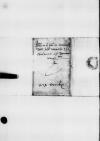Accepi Dominationis Vestrae Reverendissimae litteras et perlegi ac doleo non posse opere complere, quod corde desidero, sub eo namque cardine res meae versantur apud s(erenissimam) Bona Sforza (*1494 – †1557), Queen of Poland and Grand Duchess of Lithuania (1518-1557); the second wife of Sigismund I Jagiellon; Duchess of Bari and Rossano; daughter of Gian Galeazzo Sforza of Milan and Isabella of Aragon⌊maiestatem reginalemBona Sforza (*1494 – †1557), Queen of Poland and Grand Duchess of Lithuania (1518-1557); the second wife of Sigismund I Jagiellon; Duchess of Bari and Rossano; daughter of Gian Galeazzo Sforza of Milan and Isabella of Aragon⌋, ut magis intercessorem indigeam, quam quod pro alio me intercessurum polliceri possim.
Nescio, quibus sinistris avibus Italy (Italia)⌊ItaliamItaly (Italia)⌋ petierim, ut omnia mihi infausta successerint nec mea culpa. Inimicorum meorum invidia falsisque calumniis tanta est in me s(erenissimae) Bona Sforza (*1494 – †1557), Queen of Poland and Grand Duchess of Lithuania (1518-1557); the second wife of Sigismund I Jagiellon; Duchess of Bari and Rossano; daughter of Gian Galeazzo Sforza of Milan and Isabella of Aragon⌊maiestatis reginalisBona Sforza (*1494 – †1557), Queen of Poland and Grand Duchess of Lithuania (1518-1557); the second wife of Sigismund I Jagiellon; Duchess of Bari and Rossano; daughter of Gian Galeazzo Sforza of Milan and Isabella of Aragon⌋ mota indignatio, ut nullo pacto placari posse existimem. Feram patienti animo, quoad potero, tam graves fortunae vices. Consilium nobis resque tempusque dabunt.
Circa Dominationis Vestrae Reverendissimae negotium mentem meam domino Fabiano aperui. Is written over ...⌈... illegible⌈...... illegible⌉ss written over ...⌉ scribet abunde. Ego etsi raro in aulam me conferre soleam, accessi tamen s(erenissimam) Bona Sforza (*1494 – †1557), Queen of Poland and Grand Duchess of Lithuania (1518-1557); the second wife of Sigismund I Jagiellon; Duchess of Bari and Rossano; daughter of Gian Galeazzo Sforza of Milan and Isabella of Aragon⌊maiestatem reginalemBona Sforza (*1494 – †1557), Queen of Poland and Grand Duchess of Lithuania (1518-1557); the second wife of Sigismund I Jagiellon; Duchess of Bari and Rossano; daughter of Gian Galeazzo Sforza of Milan and Isabella of Aragon⌋ et illius mentem erga personam Dominationis Vestrae Reverendissimae explorare volui. Dicebat aliquid esse scriptum, quod Bona Sforza (*1494 – †1557), Queen of Poland and Grand Duchess of Lithuania (1518-1557); the second wife of Sigismund I Jagiellon; Duchess of Bari and Rossano; daughter of Gian Galeazzo Sforza of Milan and Isabella of Aragon⌊illiusBona Sforza (*1494 – †1557), Queen of Poland and Grand Duchess of Lithuania (1518-1557); the second wife of Sigismund I Jagiellon; Duchess of Bari and Rossano; daughter of Gian Galeazzo Sforza of Milan and Isabella of Aragon⌋ animo non sederat, tamen non video tantam indignationem, ut debeat illius aspectum vitare. Credo, si dabitur Dominationi Vestrae Reverendissimae coram copia fandi, se posse facillime expurgare et in pristinae gratiae candorem sese insinuare nemine alio patrocinante. Si quid tamen meis viribus exiguis attentare interea potero, quoad ista nubila depellantur, sinceram fidem et diligentem operam polliceor.
Commendo me et servitia mea eidem Vestrae Dominationi Reverendissimae, quae felicissime valeat et me mutuum diligat.


 AAWO, AB, D. 4, f. 30v
AAWO, AB, D. 4, f. 30v